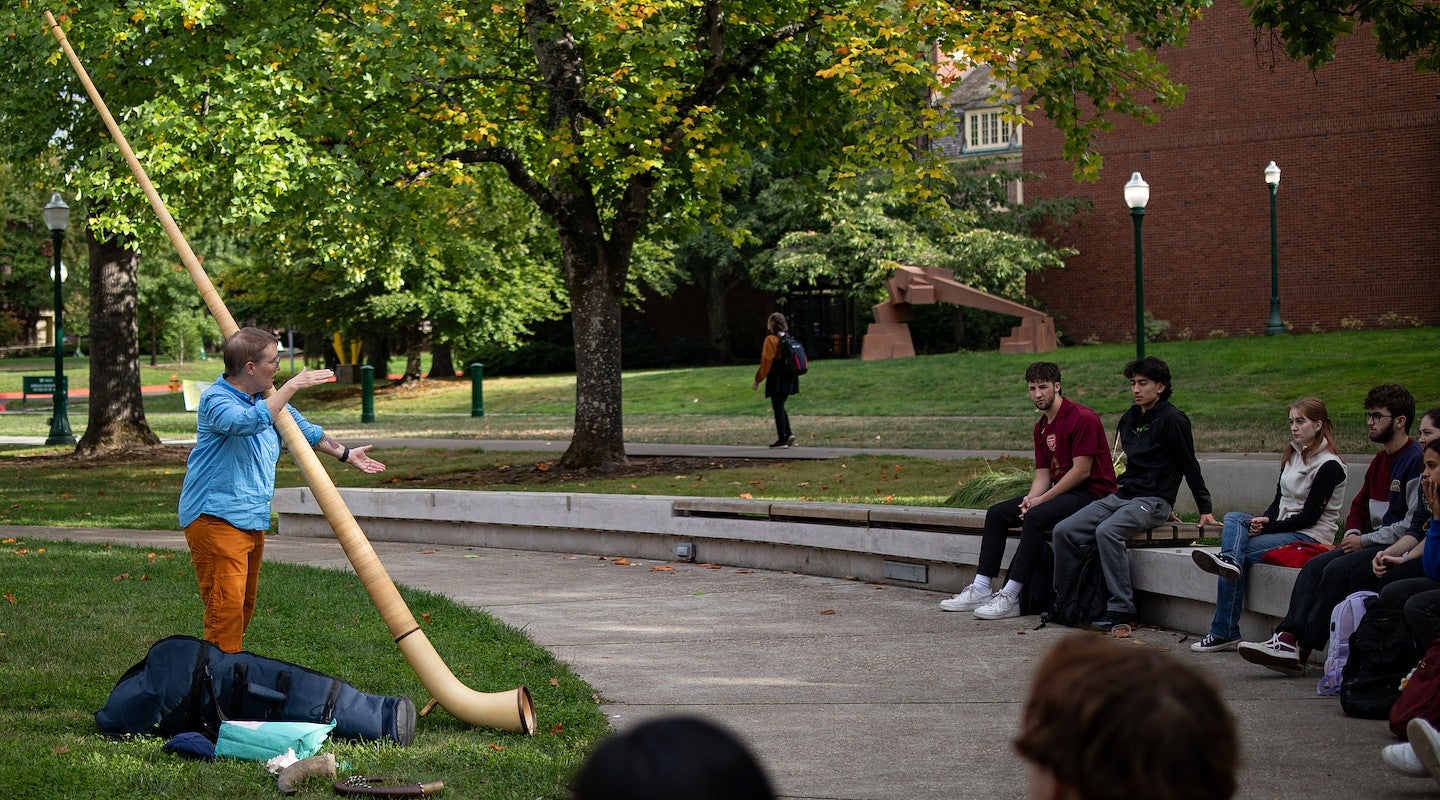
Music from the heart and mind
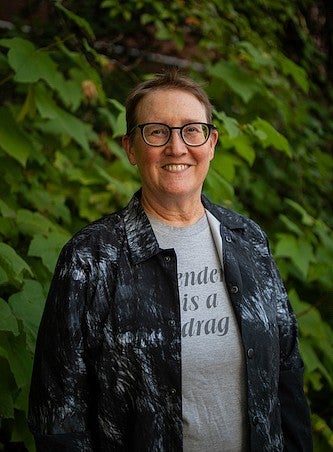
Song on repeat: “You and I” by Stevie Wonder
Coffee or tea: Either or. Coffee, tea, fruit smoothies. I’m just nonbinary in the whole thing.
Guilty pleasure: Ice cream!
Current binge: Buffy the Vampire Slayer
See them in action: Van Dreel will play in the Eugene Symphony’s rendition of Snow Queen alongside conductor and fellow CHC core faculty member Brian McWhorter from October 27-29.
In the small town of Manitowoc, Wisconsin, on the shores of Lake Michigan, you can hear the foghorns of ships passing by through the night. On a Sunday morning, trumpets play in a nearby church, welcoming all to Easter service. Eyes wide and mouth agape, a young Lydia Van Dreel falls in love with the sound of brass instruments.
Not long after, Van Dreel begged their mother to take piano lessons with the convent of nuns from the church. That quickly led to joining the elementary school band in fifth grade where they picked up the French horn for the first time. They remember thinking: “This is what I love. This is what I want to do.”
A lifelong love of music and performance turned into a career for Van Dreel. As part of the new core faculty at Clark Honors College and a faculty member in residence, Van Dreel is teaching “Music and Meaning,” which is inspired by their own experience as a music student.
CHC Acting Dean Carol Stabile said she welcomed Van Dreel to the college because “They are deeply interested in helping students make connections between their academic work and their everyday lives.”
For Van Dreel, the traditional approach to teaching music tends to be Eurocentric, white-focused and male-dominated. But Van Dreel is trying to teach music through the lens of cultural expression and identity from the perspective of the musician and performer, and they want their students to chime in.
“I’m going to pick select pieces from various eras and cultures and idioms that I think are interesting. And I’m also going to ask the students to bring what they find interesting,” Van Dreel says. “I’m looking forward to it being a real exchange of ideas and exploration of what music means.”
Discovering a true nature
Van Dreel says music was “always there” growing up. From their father’s record collection to their siblings’ musical inclinations, music consistently felt like a space where Van Dreel could be comfortable.
The siblings played trumpet, oboe, and saxophone, but Van Dreel didn’t want to follow in their footsteps. “I loved the trumpet, but my brother played the trumpet, and I didn’t want him to tell me what to do,” they recall with a chuckle.
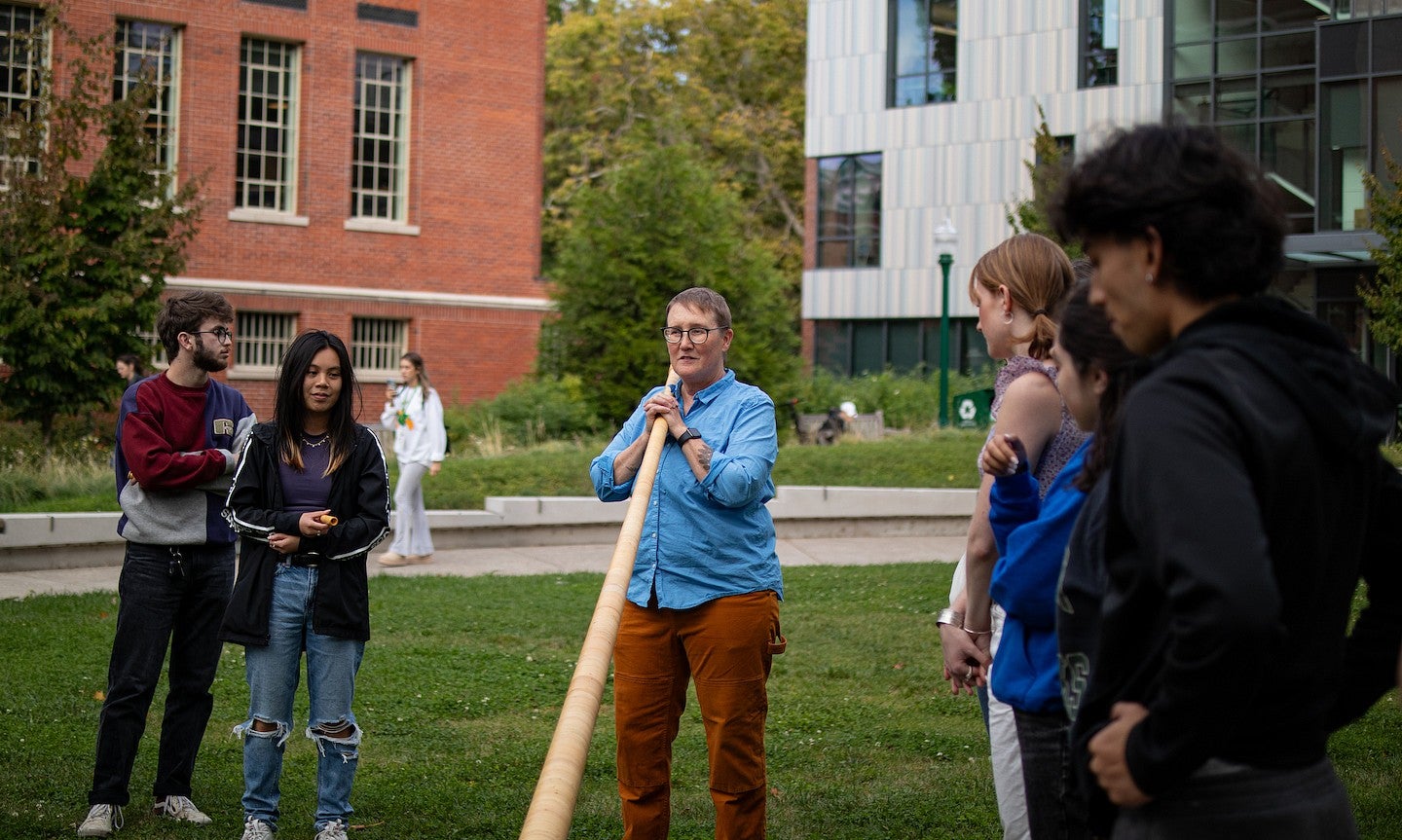
In 10th grade, Van Dreel’s band teacher assigned them to play a piece in a brass quintet. After practicing, Van Dreel remembers their friend feeling that the music was challenging and difficult to play. “I was like, ‘No, it’s not. What are you talking about?’” Van Dreel recalls. “And that was my ‘aha’ moment.”
It wasn’t that playing the horn was easy. From the beginning, they say, it just felt natural. It felt like what they wanted to pursue for the rest of their life.
Hitting the notes
Van Dreel earned a bachelor of music degree from the University of Wisconsin-Madison in 1991. Later that year, they pursued their master’s from The Juilliard School, graduating in 1993.
Moving from their state school in Madison to the small, private and highly selective Juilliard was an important transition, Van Dreel says. The bright lights of New York City “dazzled” them as they remember riding the subway for the first time.
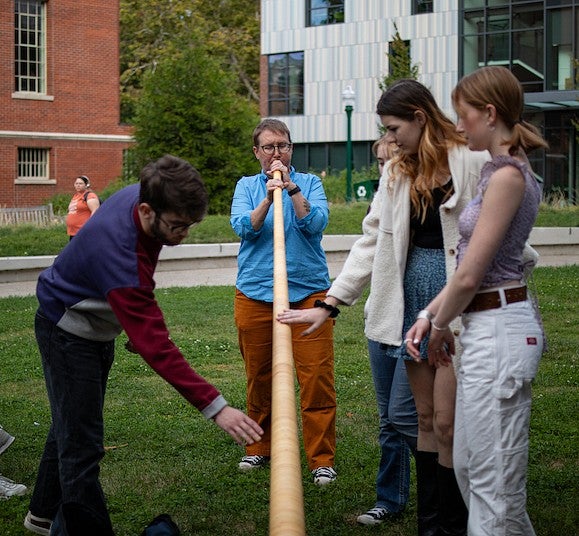
Juilliard was significantly more competitive. “It’s a bunch of very ambitious students who are working their asses off to have a career in the arts,” they say now. “I remember getting there and being like, ‘Oh, people aren’t missing notes. I better not miss notes.’”
But Van Dreel says they weren’t fazed by the pressure. Instead, they found it to be the perfect environment to hone their craft and learn from their peers. The expectations were high, Van Dreel says, but not in an intimidating way. “There was a belief that you’re there to do the work, you’re going to do the work and you will succeed because we believe in you.”
Juilliard is also where Van Dreel met William Purvis, a French horn professor who is now the head of brass studies at Yale University. Van Dreel says Purvis was their most influential teacher because of his personal approach to teaching music.
“One of the things that he helped me do was understand that I had my own ears, my own sense of perception, and that it was really important for me to pay attention to myself,” Van Dreel says. “Hearing yourself as a musician is important, but (so is) hearing yourself as an embodied human and being like, ‘Oh, I’m a person who exists in the world and I have thoughts and feelings and those are important to be attentive to.’”
Purvis describes Van Dreel as one of his favorite people, saying: “It was inspiring to a part of their instrumental and artistic development at Juilliard, and it has given me great pleasure to observe their continuous growth in every way in the years since then.”
“Hearing yourself as a musician is important, but (so is) hearing yourself as an embodied human and being like, ‘Oh, I’m a person who exists in the world and I have thoughts and feelings and those are important to be attentive to.’”
Teaching to the whole person
After Juilliard, Van Dreel held a 10-year tenured position as a full-time orchestral player for the Sarasota Orchestra in Sarasota, Florida. At the same time, they were teaching in their private studio and at a community college.
After the Sarasota job, Van Dreel joined the University of Oregon as an assistant professor of horn.
Seven years into working at UO, they met Leander Star, a recent college graduate and French horn player who auditioned for the Eugene Symphony. Star and Van Dreel have been collaborating for a decade now, and Star says Van Dreel’s been especially influential in his career.
He says Van Dreel’s biggest strength as a collaborator and professor is the way they treat the people they work with. “Their disposition can put anyone at ease, and you genuinely have the feeling that everyone is an equal human in their eyes,” he says. “They care more about each person they interact with living well than whether there is some immediate success.”
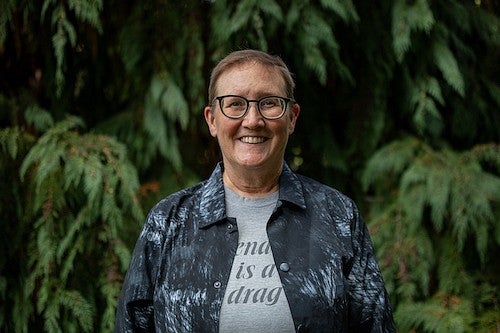
Students’ well-being is important to Van Dreel, as they understand how a student’s personal experiences affect the way that they learn and interact with material.
The key to learning, Van Dreel says, is “being really comfortable and authentic within your own self and being open-minded and curious about taking in information.”
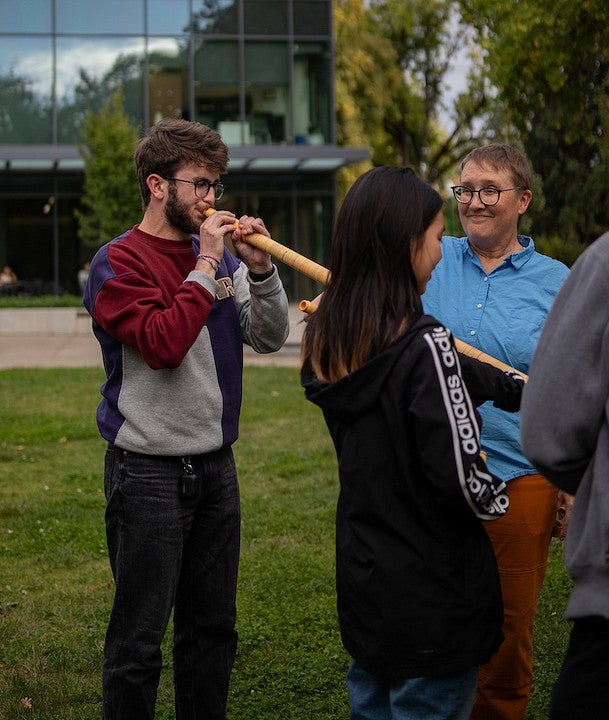
For their first CHC class of the term, Van Dreel brought their students outside and set up a variety of different horns outside of Chapman Hall. On the grass were a Maasi cow horn, a conch shell, a German post horn, and an eye-catching alphorn, stretching 12 feet across the green.
One by one, Van Dreel played each, stopping intermittently to explain the history and cultural significance of the horns. These concepts are important, Van Dreel says, but even more important was allowing everyone to find their own sensations through music and sound.
Then, the students were able to try each instrument for themselves.
“Even though the instruments were theirs, and obviously super expensive, they were just like, ‘Everyone try it, hold it, play it, whatever you want,’” recalls Carson Roach, a sophomore media studies major. He says Van Dreel makes the class a stress-free environment that encourages student participation and expression.
That’s what Van Dreel is hoping for during their time at CHC. “It’s an experience of your senses and an experience of being alive,” Van Dreel says. “And that’s why we’re here.”
